War

Growing up in Kuwait, Asif Balbale thought he wanted to become a chemical engineer. He never imagined enlisting in the U.S. Navy, much less becoming an imam.
Balbale got his engineering degree after immigrating to the U.S. at age 21. With jobs hard to come by, he tried to enlist in the Army, but didn't weigh enough. Instead, he met the Navy's minimum requirements.
He was sworn in as a U.S. citizen in 2005 while deployed aboard the USS Boxer. Intending to apply for an officer program, Balbale, 31, mistakenly emailed a recruiter for the chaplain corps.
"God, I think, had better plans for me," Balbale said, looking back.
And so it is for a number of military chaplains who, by twists of fate or perhaps divine Providence, found their calling to become chaplains while on active duty.
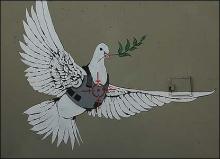
Today I was catching up on emails and came across two messages that deeply affected me, maybe because I read them back-to-back.
The first one is from a friend who helped release the “Collateral Murder” video via Wikileaks, showing US troops shooting some unarmed folks in Baghdad, including two children sitting in a van as their family stopped to pick up the wounded and dead. It is one of the most disturbing and heartbreaking videos I’ve ever seen. Feel free not to watch it.
NOTE: If you do watch the video inside the blog, please know that it is contains vivid images of war. It was released here:
The other email message I read was just the opposite. It was about life.
During the first-ever all-virtual interview conducted by Americans via Google+'s "hangout" group video chat feature, a young, homeless veteran in Boston asked President Obama why the United States still gives money to countries such as Pakistan, that are known to fund terrorism — especially when there are so many veterans living on the streets after returning from the war. The session was broadcast live via YouTube.
Watch the video of their conversation inside the blog...
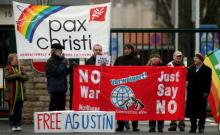
One of the U.S. Constitution's difficult balances is found in the freedom of religion clause of the First Amendment:
“Congress shall make no law respecting an establishment of religion, or prohibiting the free exercise thereof …”
What happens when those two values conflict?
That is the issue with the controversy over whether religiously-affiliated organizations should be required to offer free coverage for contraception in health insurance plans made available to employees. Those opposed — most notably Catholic organizations — claim that this requirement would violate their freedom of conscience. Those who support it claim that exempting religiously-affiliated organizations would establish a religion over the rights of individuals.
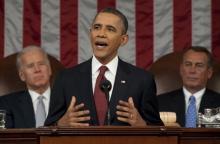
From President Obama's 2012 State of the Union Address:
The defining issue of our time is how to keep that promise alive. No challenge is more urgent. No debate is more important. We can either settle for a country where a shrinking number of people do really well while a growing number of Americans barely get by, or we can restore an economy where everyone gets a fair shot, and everyone does their fair share, and everyone plays by the same set of rules. (Applause.) What’s at stake aren’t Democratic values or Republican values, but American values. And we have to reclaim them.
Let’s remember how we got here. Long before the recession, jobs and manufacturing began leaving our shores. Technology made businesses more efficient, but also made some jobs obsolete. Folks at the top saw their incomes rise like never before, but most hardworking Americans struggled with costs that were growing, paychecks that weren’t, and personal debt that kept piling up.
Read the full text of the SOTU Address inside the blog...
In the fall of 2002 and winter of 2003, a steady drumbeat of rhetoric and accusations from the Bush administration were leading the United States into war against Iraq.
Saddam Hussein had weapons of mass destruction he was planning to use against us. Hussein had worked with al Qaeda to carry out the 9/11 attacks. We could replace a brutal dictatorship with a democracy that would become a model for the Middle East. And so on.
After the invasion and 8½ years of war, all were proven false. Iraq did not have any WMDs, there was no connection with al Qaeda, and Iraq continues to be wracked with sectarian violence.
Over the past few days, news sources have reported on a new National Intelligence Estimate (NIE) on Afghanistan delivered to the White House in December. NIEs represent the consensus view of the CIA and 15 other intelligence agencies on national security issues, and are completed for use by high-level policy makers.
The document remains classified, and news reports have emphasized different points.
McClatchy Newspapers wrote of a warning that “Taliban leaders haven't abandoned their goal of reclaiming power and reimposing harsh Islamic rule on Afghanistan.” The article quotes “a U.S. official” as saying, "There is no indication that the Taliban are ready to settle for a goal short of total control over an Islamic emirate."
While the U.S. military has made some gains since President Obama sent additional troops a year ago, the article says the NIE concludes they may not be sustainable.

If the GOP primaries were like Old Country Buffet, I’d be happy.
Think about it. There wouldn’t be so much money involved and we could pick only the stuff we liked and ignore the rest.
And of course, everyone knows the basic rules of smorgasbord grazing, such as you can’t get decent sushi in the Midwest or proper social conservatives from Massachusetts.

Is not this the fast that I choose: to loose the bonds of injustice, to undo the thongs of the yoke, to let the oppressed go free, and to break every yoke? – Isaiah 58:6 (NRSV)
A pervasive criticism of modern Christians, both from outsiders as well as concerned Christians, is that people of faith are not taking seriously Jesus’ call for us to serve “the least of these.”
Thankfully, we may be turning a corner.
Last week in Atlanta, more than 42,000 Christians packed the Georgia Dome for four days to participate in Passion 2012. Spearheaded by Passion Conferences founder Louie Giglio, Passion 2012 is another in an ongoing series of conferences intended to engage the “university moment” with Jeusus’ compelling message.
What made Passion 2012 so compelling for so many wasn’t the impressive list of popular Christian speakers, including Francis Chan, John Piper, and Beth Moore. It wasn’t the popular worship music of Chris Tomlin, the David Crowder Band, Charlie Hall, and Kristian Stanfill. Nor was it the presence of 2011 Daytona 500 winner Trevor Bayne.
It was the call to action — the invitation to make Jesus’ message of social justice a reality in this world.

I’m not sure we can quite get our heads around the latest ‘war’ being waged in the United States – the ‘war on Christmas’.
Visions of the 101st Airborne heading towards the North Pole abound. Anti-reindeer defense weapons, covert elf anti-merriment operatives and a unilateral ban on all copies of A Christmas Carol (in its various media iterations)? Is that what we have come to?
Surely — and thankfully — not, but given some of the rhetoric that is thrown around in the media at this time of year, you might be forgiven for thinking so!
Given that most reporting about religion in the UK and Europe usually includes the phrase “an increasingly secular country," you might think that the "war on Christmas" back on the old sod is even more sustained and sophisticated than in the United States.
Picture heavily fortified nativity scenes being assaulted by atheist flash mobs chanting “HAPPY HOLIDAYS!” if you will.
Well, I’m sorry to tell you that I’ve yet to witness such a terrifying scene on the streets of London.
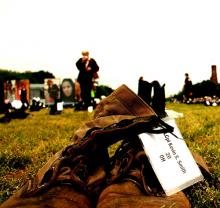
It does no dishonor to those who served to learn from the mistake that was made in starting an unnecessary war in Iraq. And, to realize that it is a mistake the U.S. continues to make. Andrew Bacevich, a Boston University professor who is also a West Point graduate, Vietnam combat veteran and retired Army colonel; and whose son was an Army officer killed in Iraq put it best. "The final tragedy of a tragic enterprise is that the U.S. has learned next to nothing," he says. "The belief that war works remains strangely intact."
President Obama’s announced plan has U.S. troops leaving Afghanistan by the end of 2014. The American people, and now the U.S. Senate want them home sooner. As we watch the last U.S. troops leaving Iraq, there are still nearly 100,000 remaining in Afghanistan. Nearly 2,000 have died, and the cost is now nearly $500 billion.
After a decade, it’s time to bring also them home.

Despite all that I knew 40 years ago about the policy and politics of the Vietnam war, I learned much more by simply listening to veterans. Late at night, often in bars, I heard about the war from the experience of those who fought it. And that taught me more than everything I had ever read. With tens of thousands of vets coming home from Iraq in the next two months -- and many more returning from Afghanistan over the next two years -- we'll have plenty of opportunities to say thanks, and then just listen.
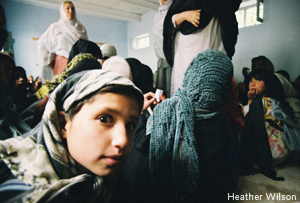
During interviews with more than a dozen Afghan women leaders, researchers, international aid workers and former Afghan government officials, we learned of persistent dangers and threats to the country's future.
Afghan women face continuing repression. They are witnessing the erosion of previous gains as Taliban control spreads in the countryside and reactionary warlord influence increases within the Kabul regime. The government's own security forces are often responsible for violations of women's rights. Check back in a few days for a more detailed account of what we learned.
The withdrawal of foreign forces will produce an economic crisis for the government of Afghanistan, which remains almost completely dependent financially on the U.S. and other foreign governments, especially to pay for its huge 300,000-person security forces. I wrote about this funding failure in an earlier post.
A new security agreement between Kabul and Washington is likely to call for the continued presence of U.S. military forces in the country beyond the 2014 transition deadline. This is seen as necessary to provide security for Kabul, but it could also have the effect of prolonging the insurgency and impeding prospects for reconciliation.
It was clear from what we heard that maintaining security requires more than deploying a large number of troops.

Because this week -- months after the Arab Spring, and after weeks of the growing Wall Street Occupation -- well, in this climate of discontent and dissent as we all begin to wake from our consumer induced coma to see how multi-national corporations control so much more than we can imagine, in a season when tyrants are being over thrown, I simply could not preach a sermon in which I say that God is like an angry murderous slave owning king. Maybe there is a way of finding good news in that but I just couldn't do it.
Week end's latest news as well as a few pieces you might have missed from the past few days. Check back on Sunday for a review of "The Mighty Macs," a few longer essays from SoJo staff and friends, and the latest news on the U.S. troop withdrawal from Iraq after nine years of war.
I had seen people my age start successful businesses, become pop-stars and even play a key role in partisan political campaigns, but I had never seen them develop and sustain a social movement.
Sure there have been more focused shifts around issues like educational equity, LGBT rights or global poverty that my generation has had a hand in shaping, but nothing that quite had the look or the feel of what I imagined the anti-War or Civil Rights movements of the 1960s to have been. I assumed we -- my contemporaries ( I'm 27) -- simply didn't possess the interest or the will-power to accomplish something that big.
I was wrong.

